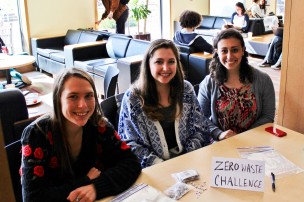
The Climate Ambassadors student group and the University Sustainability Office organized a weeklong event challenging students to practice sustainable living. The experiment, called the Zero Waste Challenge, is taking place on college campuses nationwide. It began on Sunday, Oct. 5 and will conclude on Saturday, Oct. 11.
Participating students have been challenged to put all non-recyclable and non-compostable waste in a Ziploc bag in order to become more aware of how much waste they generate. The bags, pinned to participants’ backpacks, serve as constant reminders of the waste that one produces over the course of a day or week.
Rebecca Sokol ’15 and Rachael Metz ’16 served as co-facilitators of the event. Metz, an intern in the Sustainability Office and member of Climate Ambassadors, assisted students in signing up for the Challenge Monday at Usdan and emphasized the power of the challenge.
“Because the waste is physically attached to them, hopefully they will think about their consumption more, and try and reduce their waste in the future,” Metz said. “I hope that it helps people recognize their consumption every day.”
First-year students living in 200 Church, Clark, Butterfields A and C, and Westco were offered the bags and a chance to participate through their Eco Facilitators, members of a new program run by the Sustainability Office. The program, also organized by Sokol and Metz, intends to encourage sustainable living by increasing students’ awareness of environmental concerns as well as informing them of how to live in a more environmentally responsible way.
Matthew Pelton ’17, an Eco Facilitator in Butterfields A, spoke about the responsibilities involved.
“As an Eco Facilitator, it is my job to be a sustainability advisor and resource in the dormitory that I am assigned to,” Pelton said. “This most importantly includes advertising for campus projects and sharing information about proper sustainability practices such as recycling, composting, and conserving water and electricity.”
Pelton further stated that he hopes the Zero Waste Challenge will help students become aware of other options for disposing of waste.
“I expect the zero waste challenge to help raise awareness about the abundant recycling and composting options at Wesleyan through both participants struggling to reduce waste and others observing these strange bags of trash on people,” Pelton said.
Amanda Farman ’17 signed up for the Challenge on Monday and was optimistic about its effect on her production of waste.
“I feel like having this on my back will definitely make me use less. I think it’s interesting that reducing waste has to do with seeing it and having it out there,” Farman said.
The bags will not hold all of the trash generated by the average student in one week’s time. However, the goal of the Challenge is not to collect all of the waste that one accumulates but rather to raise awareness of just how much one throws away in such a short span of time.
“It’s made me notice how much waste a person produces in a week, and it’s kind of surprising.”— Sickinger
Christina Sickinger ’18 spoke to the impact the Challenge has had on her own awareness.
“It’s made me notice [that] a lot of the things I throw away, I don’t actually have to,” Sickinger said. “It gives me a reason to compost and recycle more. It’s really interesting. I think it’s going well. It’s made me notice how much waste a person produces in a week, and it’s kind of surprising.”
In addition to emphasizing the amount of waste students generate in a day, the Challenge has also encouraged people to take note of the type of trash they find themselves accumulating. Lilly Sandberg ’18 stated that the Challenge has made her aware of ways that both students and the University could decrease waste.
“I think the thing that has been most interesting so far is that my whole bag is full of Usdan receipts, which are recyclable, but they always end up just floating around in my bag,” Sandberg said. “I never actually go to the recycling bin to throw out my receipts. It’s making me really angry about the use of receipts at Usdan. Even if they were smaller, they would be using less paper.”
After this week concludes, the event aims to encourage students—both participating and observing—to continue developing sustainable practices.
Pelton emphasized that there are easy adjustments students can make to decrease the amount of waste they produce.
“Fortunately, Wesleyan makes it very easy for students to reduce waste,” Pelton said. “The biggest tips I would give to students are to know what you can recycle. Did you know you can recycle yogurt cups but not paper coffee cups? And purchase a reusable mug because the above-mentioned coffee cups are not recyclable.”
The Eco Facilitators and Climate Ambassadors will continue to host events throughout the year focusing on sustainability, such as Do it in The Dark, a competition to determine which dorms and program houses use the least energy. Every month, the most successful residences will be recognized for their achievement.


Leave a Reply